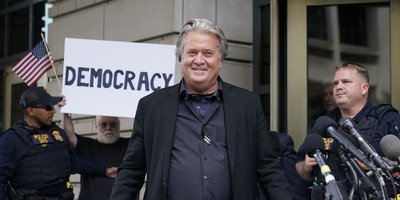President Obama is now suddenly promoting the benefits of free trade after he and his party ignored the issue and kept three agreements on the shelf for the past two years.
Throughout his 2008 campaign, Obama was openly hostile to the free trade pacts, and to the successful North American Free Trade Agreement, especially at labor union rallies. It alarmed Canada, our largest trading partner, to the point where Obama's longtime economic adviser Austan Goolsbee met with Canadian officials and assured them the anti-NAFTA talk was for campaign consumption only and should not be taken seriously.
But global trading countries have learned otherwise. Obama has done nothing to seek ratification of tariff-reducing trade agreements with South Korea, Columbia and Panama that were negotiated under George W. Bush. The White House sat on the pacts, while congressional Democratic leaders denounced them and allowed fast-track trade negotiating authority to expire.
The result: U.S. exports, which climbed rapidly in the past decade, reaching $1.7 trillion annually, have declined, further weakening our job market here at home.
Now Obama is in the midst of a whirlwind trade-promoting tour of India, Indonesia, South Korea and Japan aimed at opening up Asian markets to U.S. goods and services and boosting the lagging U.S. economy.
Indeed, he's beginning to sound like a born-again free trader, which would have drawn him much praise from free-market economist Milton Friedman.
"I'm here because I believe that in our interconnected world, increased commerce between the United States and India can be a win-win proposition for both nations," Obama told the U.S.-India Business Council this week. And in an apparent admonition to his party's liberal union base back home, he added, "I realize that for some, this truth may not be readily apparent."
Recommended
Just where and when Obama got religion on free trade remains a mystery, but I suspect a feeble economic recovery, with mediocre economic growth rates of between 1.7 percent and 2 percent, and unemployment stuck at nearly 10 percent had something to do with it.
Losing 60 House seats to the Republicans and six seats in the Senate has a way of refocusing the mind, especially if one is focused on winning the election in 2012.
His stimulus-spending binge isn't working. His advisers are telling him the sky-high unemployment rate isn't going down much anytime soon and may worsen. He will need to boost job creation to 300,000 a month to bring down unemployment. Last month's 151,000 jobs didn't cut it.
But the president and his party "have done worse than just stand still (on trade). They've actively backtracked, adopting protectionist measures that soothe special interests but leave the vast majority of U.S. companies and their workers even more handicapped in our highly competitive global economy," Heritage Foundation fellow James Roberts said in a trade analysis this summer. One major example of the administration's hostility to trade was the "Buy America" procurement provision in last year's stimulus bill that enraged our trading partners. Obama has continued to waffle on the issue, declining to submit the three trade agreements in his desk drawer for approval, saying he wanted to renegotiate them first.
Meantime, "free trade policies are more popular around the world today than ever before," according to a recent Heritage study that also showed the most prosperous countries are the ones with the most open trade policies. "Recessions typically spark short-sighted calls for protectionism, so you'd expect a broad retrenchment of trade freedom during a global recession," writes Bryan Riley, Heritage's senior trade policy analyst.
"Instead, Heritage found the vast majority of countries last year maintained or even strengthened their commitment to free trade," his study of trade freedom in 178 countries found.
In the last decade, free trade scores improved in 142 countries and declined in only 11. There is a "world-wide movement toward freer markets," he said. "Trade freedom stands at a record high."
Overall, his study found that 85 countries improved their scores over the past year, 39 of them by a full point or more, while only 36 regressed. Sadly, the U.S. was one the countries that slipped slightly as a result of an increase in the average tariff rates imposed on imports.
But as the economy showed continuing signs of weakness that resisted all of his "snake oil" spending remedies, someone apparently told Obama that expanding global trade deals would open up markets for U.S. goods and create more jobs here at home.
So the president is traveling the global trade route across Asia this week, appealing for more access to its growing markets, offering to sell more made-in-America goods, including $10 billion in military and civilian aircraft, jet engines and mining equipment for India.
But it would be wrong to think that Obama is truly a new convert to free trade. He is doing this out of sheer economic frustration -- and desperation -- over his failed jobs policies.
"I do get discouraged (about the economy)," he admitted Sunday in an interview on CBS's 60 Minutes, just before leaving on his trip. "I thought the economy would have gotten better by now."

























Join the conversation as a VIP Member